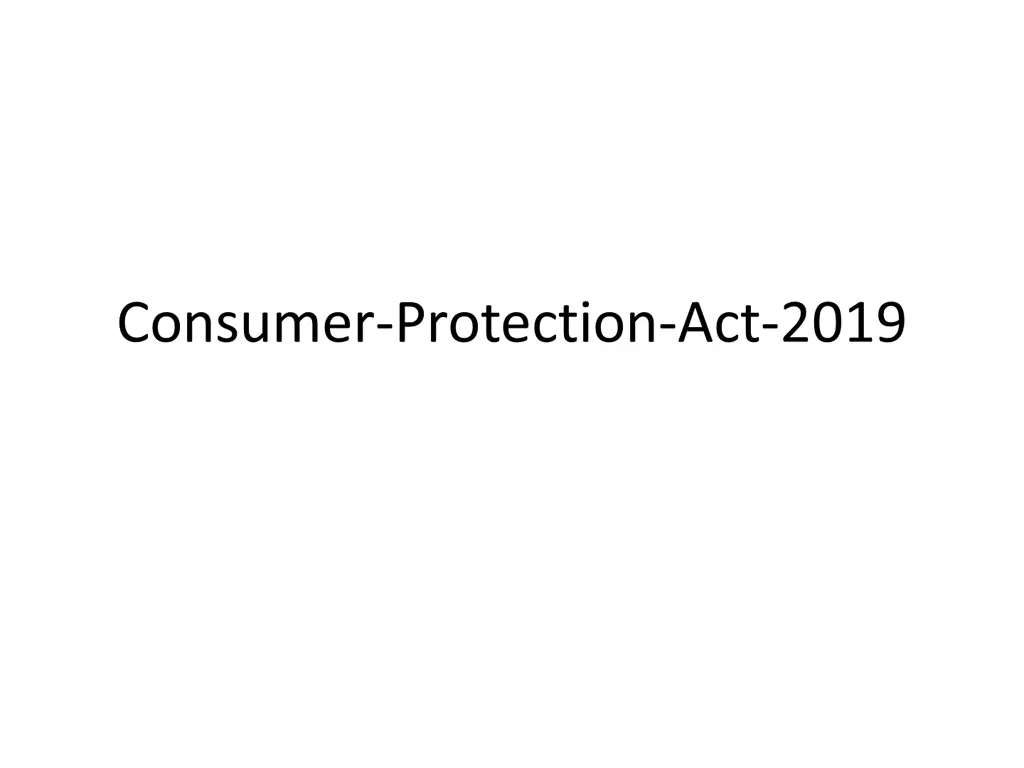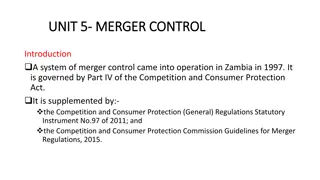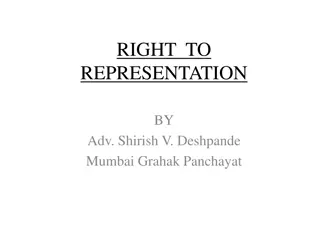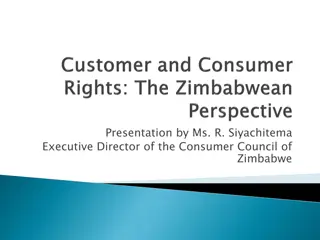Consumer Protection Act 2019
The Consumer Protection Act 2019 and its aim to protect consumers' rights. Explore a comparative study of the 1986 and 2019 acts, the establishment of a Central Consumer Protection Authority, simplified dispute resolution mechanisms, and the liability of businesses for defective products or services.
Download Presentation

Please find below an Image/Link to download the presentation.
The content on the website is provided AS IS for your information and personal use only. It may not be sold, licensed, or shared on other websites without obtaining consent from the author.If you encounter any issues during the download, it is possible that the publisher has removed the file from their server.
You are allowed to download the files provided on this website for personal or commercial use, subject to the condition that they are used lawfully. All files are the property of their respective owners.
The content on the website is provided AS IS for your information and personal use only. It may not be sold, licensed, or shared on other websites without obtaining consent from the author.
E N D
Presentation Transcript
Comparative Study of CP,Act 1986 & 2019 CPA,1986 CPA,2019
The aim and objective along with the purpose for which the act was established, is explained under Section 6, 8 and 8B of the Consumer Protection Act, 1986. Section 6 goes on to detail the rights which the act aims to protect and lists them as: Right to safety of life and property from hazardous goods. Right to information about the quality, quantity, potency, purity, standard and price of goods and services so as to protect consumers against unfair trade practices. Right to choice as to variety of goods and services. Right to be heard and representation and to be assured that consumer interests will receive due consideration at appropriated platform. Right to seek redressal against unfair trade practices or restrictive trade practices or unscrupulous exploitation of consumers. Right to consumer education
The Consumer Protection Act 2019 is more holistic and stringent after rules are framed to protect the interest of the consumers The Act proposes the establishment of a Central Consumer Protection Authority (CCPA) to promote, protect and enforce the rights of consumers, and make interventions in situations of unfair trade practices. The Act provides for a simplified dispute resolution mechanism, with a provision for mediation and e-filing of cases. The consumers can file complaints at a district or state consumer commission closest to their residence, rather than the location where the service or products were sold. Consumers can drag manufacturers and sellers of adulterated and spurious products to court and claim compensation, as is applicable.
Under the aegis of the new Consumer Protection Act, 2019, a product manufacturer and seller will be liable to provide compensation for injury or damage caused by a defective product or service. The errant businesses will be penalized with up to 6 months in jail or a fine of up to Rs 1 lakh if the consumers do not suffer any injuries. In cases where the consumer is injured, the fine to the manufacturer, seller or distributor could go up to Rs 5 lakh and up to seven years in jail. In case of death of the consumer, the culprit will have to pay a minimum fine of Rs 10 lakh and spend seven years in jail, which can be extended to life imprisonment.
Unit-I Brief History of Consumer Movements in India Aims and Objectives of Consumer Protection Act - Rights of Consumers under Consumer Protection Act Definitions- Complainant, Complaint, Consumer, Defects, Deficiency, Service, Goods Hazardous to Life & Safety, Unfair Trade Practices, Restrictive Trade Practices
The new Consumer Protection Act, 2019 came into force on 20thJuly 2020 and it will empower consumers and help them in protecting their rights through its various notified rules and provisions. The new act will be swift and less time consuming compared to the older Consumer Protection Act, 1986 in which single-point access to justice was given making it a time-consuming exercise. The old act provided for a three-tier consumer dispute redressal machinery (National Consumer Commission), State and District levels. at the National Redressal Disputes
Key Points The Consumer Protection Act, 2019 establishes the Central Consumer Protection Authority (CCPA) whose primary objective will be to promote, protect and enforce the rights of consumers. It is empowered to: Conduct investigations into violations of consumer rights and institute complaints/prosecution. Order recall of unsafe goods and services. Order discontinuance of unfair trade practices and misleading advertisements. Impose penalties on manufacturers/endorsers/publishers of misleading advertisements.
Rules on E-commerce and Unfair Trade Practices: The government will notify the Consumer Protection 2020 under the Act whose broad provisions are given below. (E-commerce) Rules, E-commerce entities are required to provide information to consumers, relating to return, refund, exchange, warranty and guarantee, delivery and shipment, modes of payment, grievance redressal mechanism, payment methods, security of payment methods, charge-back options and country of origin. These are necessary for enabling the consumer to make an informed decision at the pre-purchase stage. These platforms will have to acknowledge the receipt of any consumer complaint within 48 hours and redress the complaint within one month from the date of receipt. They will also have to appoint a grievance officer for consumer grievance redressal.
The Consumer Protection (E-commerce) Rules, 2020 are mandatory and are not advisories. Sellers cannot refuse to take back goods or withdraw services or refuse refunds, if such goods or services are defective, deficient, delivered late, or if they do not meet the description on the platform. The rules also prohibit the e-commerce companies from manipulating the price of the goods or services to gain unreasonable profit through unjustified prices.
Product Liability: A manufacturer or product service provider or product seller will be held responsible to compensate for injury or damage caused by defective product or deficiency in services Basis for product liability action: Manufacturing defect. Design defect. Deviation from manufacturing specifications. Not conforming to express warranty. Failing to contain adequate instructions for correct use. Service provided-faulty, imperfect or deficient.
Punishment for Manufacture or Sale of Adulterated/Spurious Goods: In case of the first conviction, a competent court may suspend any licence issued to the person for a period of up to two years and in case of second or subsequent conviction, may cancel the licence permanently.
Alternate Dispute Resolution Mechanism of Mediation: A complaint will be referred by a Consumer Commission for mediation, wherever scope for early settlement exists and parties agree for it. The mediation will be held in the Mediation Cells which will be established under the aegis of the Consumer Commissions. There will be no appeal against settlement through mediation.
Simplification of the Consumer Dispute Adjudication Process: Empowering the State and District Commissions to review their own orders. Enabling a consumer electronically and in consumer commissions that have jurisdiction over the place of his residence. Video-conferencing for hearing and deemed admissibility of complaints if the question of admissibility is not decided within the specified period of 21 days. to file complaints
Other Rules and Regulations: As per the Consumer Disputes Redressal Commission Rules, there will be no fee for filing cases up to Rs. 5 lakh. The credit of the amount due to unidentifiable consumers will go to the Consumer Welfare Fund (CWF). State Commissions will furnish information to the Central Government on a quarterly basis on vacancies, disposal, the pendency of cases and other matters. Apart from these general rules, there are Central Consumer Protection Council Rules, provided for the constitution of the Central Consumer Protection Council (CCPC). It will be an advisory body on consumer issues, headed by the Union Minister of Consumer Affairs, Food and Public Distribution with the Minister of State as Vice Chairperson and 34 other members from different fields. It will have a three-year tenure and will have Minister-in-charge of consumer affairs from two States from each region- North, South, East, West, and North-East Region.
Consumer-Protection-Act-2019 Its-Preamble An Act to provide for protection of the interests of consumers and for the said purpose, to establish authorities for timely and effective administration and settlement of consumers' disputes and for matters connected therewith or incidental- thereto.























